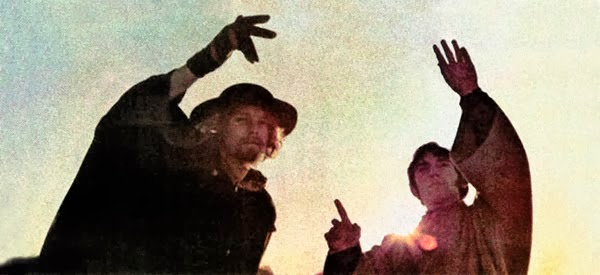December 11th is the traditional date of the “Miscellany”
tapes I made Kajsa all through school and into college. The tapes bring
together the kind of Brit folk-based rock that flourished from 1968 to about
1974. It’s me middle-school music, mainly. Kids who got into Dungeons and Dragons or Harry Potter
will look back on their middle-school years the way I look back on Brit prog
rock.
Today’s song, the lead-off from The Hangman’s Beautiful Daughter, the best-known and most acclaimed
album by the Incredible String Band, isn’t a song I knew way back then. I heard
of, but never heard, ISB back then. Led Zeppelin gave them credit for inspiring
their own turn to Brit folk sounds with Zep’s third and fourth LPs and, as
those are two of my favorite Zep albums, that should have sent me off to ISB.
It did happen, but not until making those tapes for ma fille unique had me hunting down things I’d missed. And since
she’s visiting tonight to go with me to see what I hope to be worthwhile
theatrical experiences tonight and tomorrow night, it’s fittin’ that I go for
Miscellany music today.
We both got a big kick out of “Koeeoaddi There,” which
begins as a kind of homage to growing things and seasonal change—and, I gotta
say, I’m a sucker for equinoxes and solstices—and then goes into a reminiscence
about a childhood home, being destroyed—“Carving away the mountain whose name
is your childhood home”—but also fondly remembered. “We were trying to buy it,
buy it, buy it.” The song sounds as if it’s reacting to some kind of rural
development scheme—you know, “they paved paradise and put up a parking lot.” And
they chopped down this mountain too.
In the midst of this is a vaguely medieval-sounding riddle.
(And one reason I referenced Dungeons and
Dragons is that a theater production I saw Tuesday by the Rude Mechs began
with a DD-like game and involved riddles 6 “clans” had to solve; I was in the
River Clan and our riddle involved four elements, four beverages, and four
directions on a compass rose . . . very like this weird little riddle in the
midst of this song.) Earth, water, fire,
and air / Met together in a garden fair / Put in a basket bound with skin / If
you answer this riddle / If you answer this riddle / You’ll never begin.
A segment like that would be enough to earn this song its
place in a Miscellany, but then come the reminiscences of “skating on Happy
Valley pond” (with that wonderful drop in “pond”), and lines like “The ice was
nice. Hello the invisible brethren.” Well, yeah, we’re always happy to welcome
the invisible brethren—angels and ministers of grace, defend us! And the part
about sitting as a child on the garden wall while people came and went—the
postman, the baker—and “Mrs. Thompson gave me a bear / Bridget and some people
lived upstairs.” It truly does sound like a child’s reflection, particularly
with Robin Williamson’s oddly pitched and paced vocals that seem to veer all
over with scant sense of scansion and melody—the way children singing to
themselves often do. It all sounds very authentic, in other words, and that’s
the magic “open sesame” of childish wonder.
And that bit about ladybird and her wish—for a dish with a
fish—reminds me, along with the riddle, of Lewis Carroll and things like “un-dish-cover
the fish or discover this riddle.” Yup.
The songs on the Hangman’s
Beautiful Daughter can become a bit taxing if you’re only half listening
because the instrumentation is so odd—penny whistles and jaw harps along with
sitar and gimbri, and I would swear a kazoo on “A Very Cellular Song” (the
album’s gemstone, along with “The Minotaur Song” and “Mercy I Cry City” and
today’s track), and harpsichord and dulcimers. Far out, right? And the singing
is so very peculiar, at times almost atonal, it seems to me. Making the whole
feel almost amateurish except that these minstrels seem also rare wizard folk
of ancient arts long since lost sight of, meaning mainly fair Williamson and
Mike Heron, his dark-haired bandmate. And don’t forget Licorice McKechnie, who
almost married Bert Jansch. Huzzah!
Across the mournful morning
moor, motoring away.





2 comments:
And don’t forget Rose Simpson either! Her memoir of life in the band ‘Muse Odalisque Handmaiden’ is well worth reading
thanks for the reference!
Post a Comment